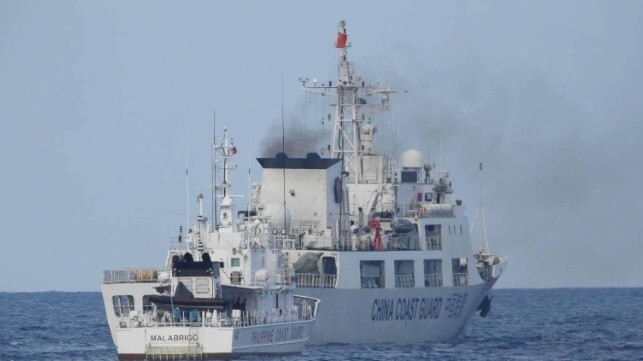Manila Sees "Urgent" Need to Begin Offshore E&P in South China Sea

The government of the Philippines believes it is "urgent" to explore for oil and gas in its segment of the South China Sea, Defense Secretary Gilberto Teodoro Jr. told Bloomberg this week. Survey work would add to a growing list of Philippine activities that run afoul of Beijing's claim to sovereignty over the South China Sea - a claim that has been rejected by China's neighbors and by the Permanent Court of Arbitration in the Hague.
Reed Bank, a rise in the Philippine exclusive economic zone in the South China Sea, has strong potential for oil and gas development. The area overlaps with China's historically-derived "nine-dash line" territorial claim, which covers the vast majority of the South China Sea.
For nearly two decades, Beijing and Manila have discussed the possibility of a joint E&P program at Reed Bank. Persistent tensions over China's attempts to control the western Philippine EEZ, including frequent physical confrontations between China Coast Guard and Philippine Coast Guard units within the Philippine EEZ, have made cooperation more difficult.
A recent legal ruling has also made a negotiated agreement less likely. Last year, the Philippine Supreme Court ruled that a 2005 cooperation agreement with China and Vietnam was invalid, because it handed too much control over Philippine sovereign resources to foreign companies. In China, the ruling was seen as "a major constraint" on oil and gas deals between the two nations going forward, researcher Ding Duo of the National Institute for South China Sea Studies told the South China Morning Post.
Since the court ruling, the administration of Philippine President Ferdinand Marcos Jr. has telegraphed its intention to begin licensing exploration activity in its own sovereign waters. In December, Marcos said that Manila wants to resolve "exploration issues" and begin producing oil and gas to meet domestic energy demand. (The Philippines is heavily dependent on energy imports.)
“It’s still the official position of the Philippines that this is not in a conflict area. This is very clearly within our EEZ (exclusive economic zone)," Marcos told NHK in December. “We have been in negotiations [with China] for over three years now, and have made very little progress."
This week, Defense Secretary Gilberto Teodoro Jr. told Bloomberg that the E&P program is a high priority - in part because China may also have its own ambitions in the area.

that matters most
Get the latest maritime news delivered to your inbox daily.
“[China's assertiveness] could mean that they really want total domination and control over everything from free passage to resources, or they want to bear hug the Philippines to make them the sole joint venture partner in the exploration or exploitation of resources in this area,” Teodoro said. "I really do think it’s quite urgent that we start now . . . Our role really is to secure the territorial integrity and sovereignty of the Philippines."
This program is contingent in part on support from the Philippines' allies, first and foremost the government of the United States. The Biden administration has been quite supportive of Philippine claims, both diplomatically and militarily, and Teodoro expressed hope that the upcoming U.S. election would not result in a change in policy.
